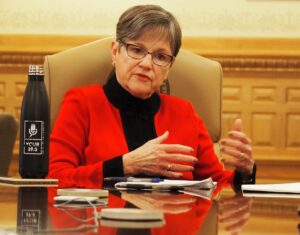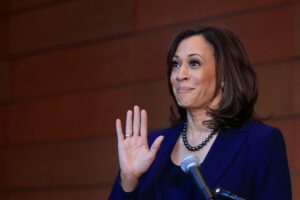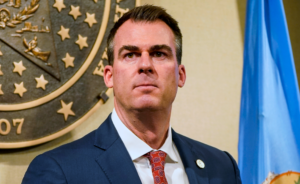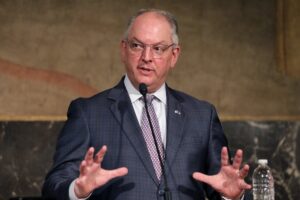Last updated on November 15, 2020
with the presidential election just five days away, the South is reeling from multiple disasters. The region has been a coronavirus hotspot since the summer, stressing hospitals and funeral homes to capacity. Extreme heat and an incredibly active hurricane season have placed the most vulnerable among us, including farm and meatpacking workers, renters, and frontline workers in even more precarious and dangerous situations. Patchwork, underfunded disaster relief has limited choices and resources — as well as voting access — for Black, brown and indigenous people in the South.
This election cycle is a referendum on how our elected officials have handled these overlapping crises, which have laid bare the systemic racial and economic inequities in this country, and this region. Yet despite major barriers to voting, this election has already seen record-breaking turnout during early voting periods. At the federal, state, and local levels, the 2020 election will significantly affect the short and long-term future of this region, from healthcare access to climate change action, from fossil fuel dependency to just transitions for rural communities that rely on extractive economies.
Here’s a state-by-state rundown of the major races and ballot measures in the South, what they could mean for the health and well-being of Southern communities and ecosystems, and resources to keep you informed before you head to the polls on Nov. 3.
Louisiana
Voting “yes” on Louisiana’s Amendment 5 would allow certain industrial facilities to pay direct payments to local governments in lieu of property taxes. Conservative state legislators have been trying to pass such an agreement for years, though this is the first time the amendment has appeared on the ballot, according to The Advocate.
The measure is supported by law enforcement and business interests and opposed by local tax assessors. A grassroots coalition of religious congregations and community groups called Together Louisiana has urged voters to vote “no” on the amendment, arguing it is a corporate tax loophole that would result in less funding for education and infrastructure, which could be dire for hurricane-battered, industry-heavy southwest Louisiana.
Also of note is the race for two of five seats on the Public Service Commission, which oversees utility companies and sets rates that residents, businesses and industry pay for electricity. Eric Skrmetta, an incumbent who is running, voted to approve over $500,000 of customer money in the commission’s contracts to his personal lawyer and business partner, according to a recent investigation by the Energy and Policy Institute. He’s being challenged by six people, including three Republicans. As E&E News reported, the outcome on Nov. 3 could lead to a Dec. 5 runoff if no candidate tops 50%.
Mississippi
Mike Espy, the first Black person to represent Mississippi in Congress since Reconstruction and former U.S. secretary of agriculture under president Clinton, is running for U.S. Senate. Espy, a Democrat, is running against Republican incumbent Cindy Hyde-Smith. He has pledged to expand healthcare benefits and broadband internet, support Mississippi’s farmers, and build a stong rural economy. Ko Bragg wrote about voter suppression and the Senate race for The 19th News.
Mississippi voters will also decide whether to approve or reject a new state flag design. The state was the last in the nation to boast a flag showcasing the Confederate battle emblem, and, after decades of debate, lawmakers decided to retire the design in July amid protests demanding racial justice as well as pressure from business and sports leaders. Mississippi has gone without a flag for months as a state commission has worked to produce a new design, called the “In God We Trust” flag, which bears a magnolia blossom.
Mississippi Today has a robust voter guide about candidates and what’s on the ballot on Tuesday.
Texas
Texas has a number of close races to watch: All congressional and state house districts are up for election this year, as well as a U.S. Senate seat and several state senate seats. Democrats need to flip only nine seats in the House in order to take control of the lower chamber. One particular race of note is in the state’s 10th district, which was redrawn in 2003 to include portions of metro Austin, Houston, and rural areas in between; Republican Michael McCaul has represented it in Washington since 2004. McCaul, a proponent of expanding oil and gas operations in the state, faces Democratic challenger Mike Siegel, a labor lawyer and former public school teacher. Siegel previously challenged McCaul in 2018, and demographic changes in the district could boost his chances. He sports a wide array of endorsements, including support by the Sunrise Movement and the AFL-CIO, as well as prominent progressive leaders including senators Bernie Sanders and Elizabeth Warren. His platform includes pushing for a Green New Deal, racial justice, and Medicare for All.
Texas voters also have a chance to decide who will fill a seat on the Texas Railroad Commission, which regulates oil, gas and other energy resources in the state. Republican Jim Wright and Democrat Chrysta Castañeda are facing off. Wright is a business owner who runs four companies in the energy industry and advertises himself as a pro-business conservative; Castañeda has degrees in industrial engineering and law, and hopes to increase transparency and oversight on the Commission, as well as enforce regulations that are already on the books. She would be the first Democrat elected to the Commission in 30 years.
Alabama
Alabama’s Democratic senator Doug Jones faces a tough re-election campaign against Republican Tommy Tuberville, a retired Auburn University football coach and Trump ally. On Reckon Interview, a political consultant spoke about how “Jones’ election changed what we thought we knew about Southern politics.” (Jones took questions from voters through AL.com‘s Facebook Live event on Wednesday.)
Voters will also have a chance to decide whether to begin an effort to remove racist language from the state constitution, including a requirement to segregate schools, on Amendment 4. Similar amendments have appeared on the ballot over the last 16 years, but have not passed.
Florida
Rep. Debbie Mucarsel-Powell, D-Fla., was the first South American-born member of Congress. She is being challenged by the Latino mayor of Miami Dade County, Mayor Carlos Giménez, who has been endorsed by President Donald Trump. Mucarsel-Powell is an immigrant from Ecuador who is running primarily on healthcare access and protections for Latinos during the COVID-19 pandemic.
Miami-Dade County commissioners Esteban Bovo and Daniella Levine Cava are vying for the Giménez’s former seat. Cava is running on a platform on improving infrastructure and expanding affordable housing. Bovo is promoting similar policies, as well as transportation and small business initiatives.
South Carolina
Jaime Harrison, the first Black chair of the South Carolina Democratic Party, is challenging longtime Republican incumbent U.S. Senator Lindsey Graham. A staunch defender of President Trump, Graham is chairman of the Senate Committee on the Judiciary and was instrumental in ensuring Amy Coney Barrett’s swift Supreme Court confirmation this week. Harrison, meanwhile, has broken fundraising records and has donated excess cash to the state’s Democratic Party, buoying down ballot candidates. (Listen to his interview on Reckon Interview). As flooding from sea level rise and more frequent and intense hurricanes inundate the Lowcountry, Harrison calls climate change “an existential threat to our coastal communities” and hopes to establish an environmental justice fund to “reinvest in sustainable infrastructure in the hardest-hit communities as well as increased support for Superfund clean-up.”
Georgia
A rare turn of events has resulted in two concurrent U.S. Senate races in Georgia this election cycle. Republican David Perdue, who has consistently voted against environmental protections, faces off against Democrat Jon Ossoff, former congressional candidate for Georgia’s 6th district. Ossoff’s website says that if elected, he’ll work to reverse the Trump administration’s environmental regulation rollbacks and will support “a historic infrastructure plan” that would, among other investments, transition the nation to renewable energy resources.
The state also has a crowded special election to fill the remaining two years of Republican Johnny Isakson’s Senate term (Isakson stepped down last year, citing health problems, and Republican appointee Kelly Loeffler has served since). The current Democratic front-runner is Rev. Raphael Warnock of Atlanta’s famed Ebenezer Baptist Church, where Martin Luther King, Jr. preached. A native of Savannah, coastal flooding is personal to Warnock, who has long been committed to addressing environmental justice. His platform states that he hopes to “advocate for marginalized people to receive training and education to participate in the green new economy and jobs” if elected.
Two out of five seats on Georgia’s Public Service Commission are up for grabs. As The Appeal reports, “both races feature Republican incumbents facing off against Democrats who are critical of how the commission has handled key issues, particularly the thousands of utility shutoffs the PSC has enabled during the pandemic.” The commission has long been criticized for being a rubber stamp for Georgia Power, the major utility in the state.
North Carolina
Democratic Gov. Roy Cooper is up for re-election — running against Republican Dan Forest — and is likely to win a second term. Cooper has led North Carolina on climate action, though he has been criticized by environmental advocates for his support of the recently canceled Atlantic Coast Pipeline.
Another high-profile race is between U.S. Sen. Thom Tillis and Democrat Cal Cunningham. The race was thrown into chaos earlier this month when Tillis tested positive for COVID-19 after attending a White House event without a mask, and Cunningham admitted to sending sexual text messages with a woman who is not his wife.
The state legislature will be important to watch: In 2019, three state judges struck down dozens of legislative districts for being “extreme partisan gerrymanders that violated the state constitution,” according to WUNC, and lawmakers were ordered to establish new boundaries for the 2020 election. There are 12 open seats — the most since 2012. Here are some of the competitive races. Civil Eats wrote about the voting barriers Black people in hog farming counties in eastern North Carolina are facing.
Tennessee
Marquita Bradshaw, a Memphis native and longtime environmental justice advocate, is the Democratic candidate running for U.S. Senate in Tennessee against Republican Bill Hagerty. The first Black woman to win a Tennessee statewide major party nomination, Bradshaw is a strong proponent of the Green New Deal, and pledges to invest in job training and education for workers in our rapidly changing environment.
Bradshaw held a press conference at the headquarters of the Tennessee Valley Authority earlier this month and criticized TVA for its handling of coal ash, outsourcing jobs, and its high executive pay levels.
West Virginia
Democrat Paula Jean Swearengin, a longtime clean air and water advocate from a family of coal miners, is running to unseat Republican Shelley Moore Capito in the Senate. Swearengin, who lost her grandfather to black lung disease, is pushing for expanded healthcare access as well as a diversified energy economy for the state.
Cathy Kunkel shares many of Swearengin’s policy goals in her race for congress to represent West Virginia’s District 2, which covers a large, central swath of the state. Kunkel helped launch the Sunrise Movement and hopes to usher in a New Deal for West Virginia, focused on investing in infrastructure for clean drinking water, improved roads, and rural broadband.
Mountain State Spotlight sent reporters to four places in West Virginia to find out what a variety of folks are thinking as they head to the polls to vote early. Find them here. For instance, young people in Fayetteville, West Virginia want infrastructure improvements prioritized, in addition to tourism.
Virginia
Sen. Mark Warner, D-Va., and Daniel Gade are facing off for Warner’s seat in the U.S. Senate. Warner is the former Virginia governor seeking his third term in the Senate. Republicans have not won a statewide race in over a decade. All 11 of Virginia’s Congressional seats are up for grabs. One of them is between Rep. Rob Wittman, a Republican and supporter of wind energy, who has held his seat since 2007, and Democratic activist Qasim Rashid, a former pro bono lawyer with the Virginia Poverty Law Center who is endorsed by the Sunrise Movement and supports a Green New Deal.
Arkansas
The race to watch is Joyce Elliott’s bid for a U.S. House seat in Arkansas’ 2nd congressional district. A Black woman from Willisville, Elliott is challenging Republican Rep. French Hill. Elliott is pushing for green jobs funding for the state, and vows to “stop turning a blind eye to bad-faith polluters that break the rules.” Her platform states she wants to “work with energy innovators to bring the future of sustainable resources to Arkansas,” though she is supportive of renewables and natural gas. Hill has supported legislation to protect public lands, but has voted against climate change and environmental justice bills.
Kentucky
Perhaps the most well known Senate race in the nation is between Senate Majority Leader Mitch McConnell and Democrat Amy McGrath. McGrath, a former Marine fighter pilot, has been working to appeal to political moderates — rather than progressives — and has focused her climate change conversations around national security. McConnell has been criticized by opponents and his base in recent years for not doing enough to support miners with black lung disease or for sustainable economic development in Appalachia despite running on a pro-coal platform for decades.
The race comes amid continued protests against police brutality in Louisville, where a Black woman, Breonna Taylor, was killed in her sleep by police earlier this year. Former progressive candidate Charles Booker, a Black man who led many of the protests, ran a competitive primary race this summer against McGrath, garnering support from Black Kentuckians as well as Appalachian voters.
Here are some other resources to check out prior to Nov. 3:
The Stakes 2020 by Facing South is a series of interviews with community leaders, organizers, and advocates highlighting what’s at stake for Southern communities during this year’s election. “We’re going beyond the candidates on the ballot to dig into how elections influence the policies, budgets, and regulations that affect Southerners’ everyday lives.”
Reckon’s 2020 podcast “The South Decides” is a one-stop shop for lessons on history and politics in the region. Listen to all the episodes here.
This article was originally published on The stakes are high for climate, environmental justice, and energy in the South






Be First to Comment